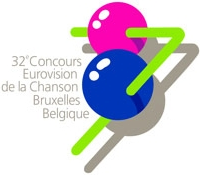1987 Eurovision Song Contest
| Eurovision Song Contest 1987 | |
|---|---|
 |
|
| Dates | |
| Final | 9 May 1987 |
| Host | |
| Venue |
Palais du Centenaire Brussels, Belgium |
| Presenter(s) | Viktor Lazlo |
| Conductor | Jo Carlier |
| Director | Jacques Bourton |
| Executive supervisor | Frank Naef |
| Host broadcaster | Radio Télévision Belge Francophone (RTBF) |
| Opening act | Viktor Lazlo singing "Breathless" |
| Interval act | Mark Grauwels |
| Participants | |
| Number of entries | 22 |
| Debuting countries | None |
| Returning countries |
|
| Vote | |
| Voting system | Each country awarded 12, 10, 8-1 point(s) to their 10 favourite songs |
| Nul points |
|
| Winning song |
"Hold Me Now" |
The Eurovision Song Contest 1987 was the 32nd Eurovision Song Contest and was held on 9 May 1987 in Brussels, Belgium after Sandra Kim's win the previous year. The presenter was Viktor Lazlo. Johnny Logan was the winner for Ireland with the song "Hold Me Now". That made him the first performer to win the contest twice, as he had won also in 1980.
The 1987 Eurovision was the biggest contest at that time, with 22 countries taking part. Only Malta, Monaco and Morocco failed to compete out of all the countries which had entered the contest in the past. Due to the number of countries, and the time it took for the contest to be held, the EBU set the limit of competing countries to 22. This became problematic over the next few years as new and returning nations indicated an interest in participating, but could not be accommodated.
Controversy erupted in Israel after their song was selected, "Shir Habatlanim" by the Lazy Bums. The comedic performance was criticised by the country's culture minister, who threatened to resign should the duo proceed to Brussels. They went on to perform for Israel, placing eighth; however the culture minister's threat was left unfulfilled.
Host conductor in bold
Notes
Below is a summary of all 12 points in the final:
In 2009 Eduard Fomin, a former employee of the Ministry of Education of the RSFSR, revealed that in 1987 George Veselov, the Minister of Education for the Soviet Union, brought forward the idea of a participation of the Soviet Union at the Eurovision Song Contest due to the number of political reforms made by the President of the Soviet Union Mikhail Gorbachev during the late 1980s. The idea was mainly a political one, with the thought that a win in the contest for the Soviet Union would impact on the relationships between the Soviet Union and the capitalist countries of the west. Valery Leontyev was suggested as a name for the Soviet Union's first participation, however Veselov's ideas were not shared by the Communist Party of the Soviet Union, or by Gorbachev himself, believing it to be too radical a step to take, and so no Soviet participation was ever made. Ten former republics of the Soviet Union would later compete in the contest on their own in the 1990s and 2000s: Russia, Estonia, Lithuania, Latvia, Ukraine, Belarus, Moldova, Armenia, Georgia, and Azerbaijan, with five of the countries going on to win the contest.
...
Wikipedia


